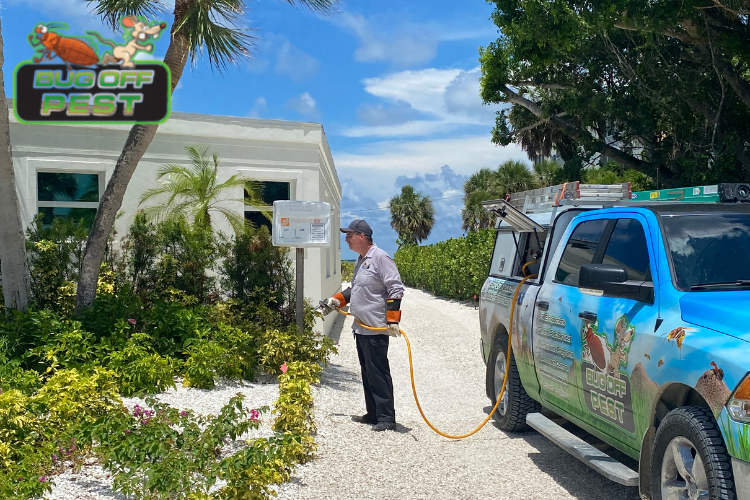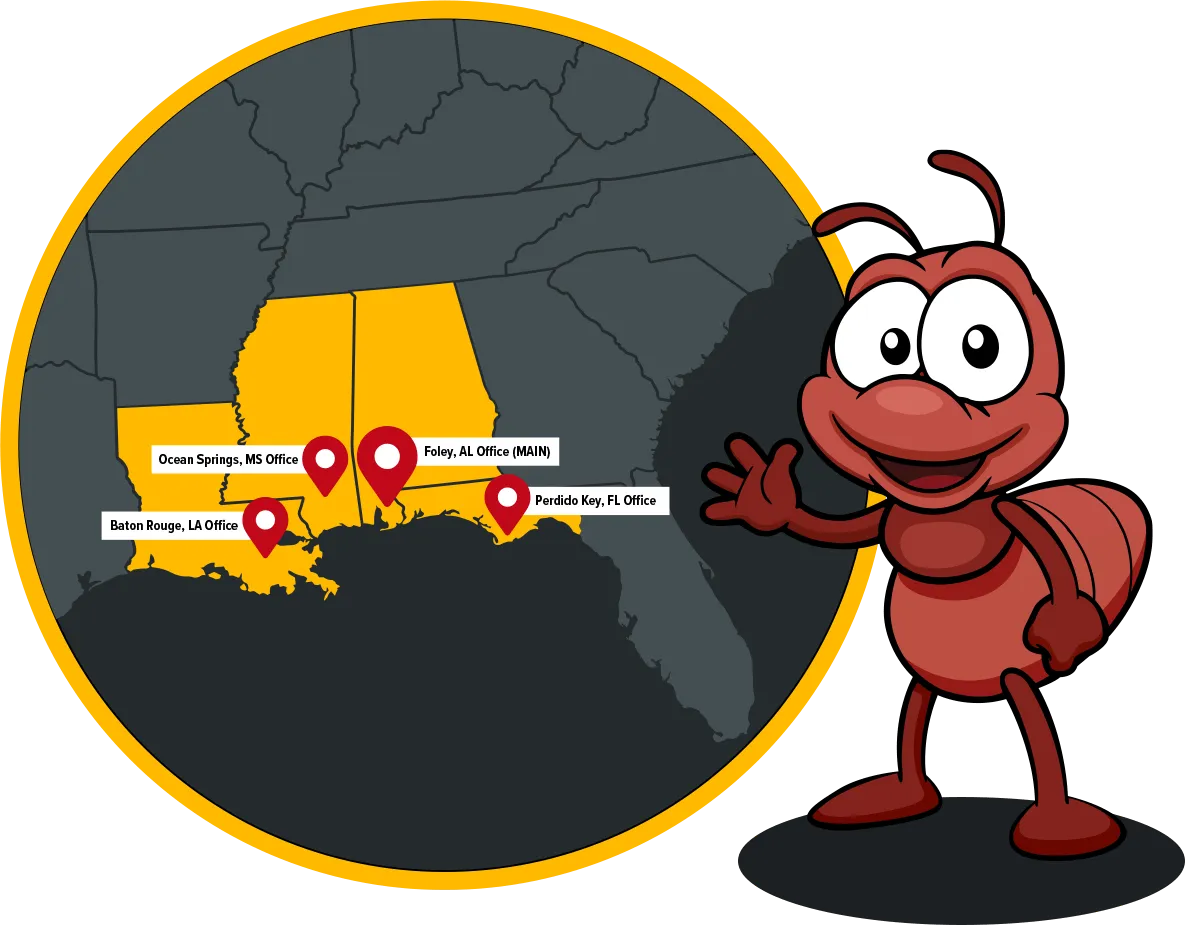Cost-effective and Trusted Exterminator in Port Charlotte for All Your Needs
Cost-effective and Trusted Exterminator in Port Charlotte for All Your Needs
Blog Article
Learn Regarding the most recent Developments in Parasite Control and Just How to Apply Efficient Treatment Solutions
In the last few years, the area of pest control has experienced substantial innovations, driven by the demand for lasting and efficient treatment solutions. Cutting-edge strategies such as Integrated Parasite Management (IPM) combine environment-friendly experiment advanced technology, enhancing both efficiency and environmental obligation. The combination of smart modern technologies and Do it yourself techniques has encouraged people to tackle parasite problems much more properly. As we check out these advancements, it becomes essential to recognize how ideal to implement these approaches in different settings to accomplish optimum outcomes. The implications for parasite administration methods might be transformative.
Eco-Friendly Bug Control Options
Recently, the demand for green pest control options has surged as businesses and home owners alike look for lasting choices to typical chemical therapies. This change is driven by expanding ecological understanding and a desire to lessen the health threats related to synthetic pesticides.

Environment-friendly bug control methods incorporate a variety of techniques that prioritize using all-natural substances and techniques. Integrated Insect Monitoring (IPM) is one such technique, integrating organic, cultural, and mechanical methods to handle parasite populations while decreasing dependence on chemicals (Wildlife removal services). This alternative approach highlights avoidance with habitat control and the intro of all-natural predators, therefore promoting a well balanced environment
Another prominent option is making use of organic pesticides obtained from plants, which often tend to be less harmful to non-target microorganisms. Products like neem oil and diatomaceous earth have gotten grip for their performance in regulating pests while presenting marginal risks to human health and the setting.
In addition, exemption techniques, such as sealing access factors and preserving cleanliness, play a critical role in green parasite administration. By taking on these sustainable techniques, individuals and services can efficiently take care of bugs while advertising a healthier world for future generations.
Smart Innovation in Parasite Monitoring
Innovation is reshaping the landscape of insect administration, with wise innovation becoming a pivotal force in improving effectiveness and efficiency - Wildlife removal services. The integration of Web of Things (IoT) gadgets, expert system (AI), and data analytics is transforming exactly how pest control experts approach infestations
Smart catches outfitted with sensing units can identify parasite task in real-time, sending out instant signals to drivers. This permits timely reactions, reducing damage and reducing the need for considerable therapies. In addition, AI algorithms analyze historic information to anticipate parasite habits, enabling aggressive interventions based on environmental problems and problem patterns.
Drones and automatic vehicles are additionally playing a significant function in bug monitoring, supplying aerial evaluations of large locations, determining hotspots, and even dispersing targeted treatments. These modern technologies not just improve operations yet also boost safety and security by limiting human direct exposure to potentially harmful chemicals.
In addition, mobile applications empower consumers to keep track of parasite task and access specialist guidance, cultivating a collaborative approach to pest administration. On the whole, the adoption of clever technology is establishing a brand-new standard in bug control, emphasizing data-driven decisions and lasting practices that inevitably profit both experts and homeowners alike.
Integrated Bug Monitoring Strategies
Integrated Bug Monitoring (IPM) employs an all natural approach to pest control, combining different methods to effectively handle parasite populations while reducing dangers to human health and wellness and the setting. IPM focuses on comprehending the pest life process, their all-natural enemies, and the community in which they prosper.
Among the basic components of IPM is checking pest populaces via routine evaluations and information collection. This permits the recognition of parasite thresholds, determining when intervention is needed. Cultural methods, such as crop rotation, environment, and sanitation control, are vital in reducing insect frequency and advertising plant health.
Mechanical controls, consisting of catches and obstacles, are likewise vital in IPM. These methods can literally get rid of or hinder parasites without the usage of chemicals. When needed, the cautious application of chemical controls is employed, concentrating on targeted therapies that reduce environmental influence.
Education and collaboration among stakeholders, including farmers, parasite control experts, and the community, are essential for the successful application of IPM techniques. By prioritizing lasting methods, IPM not just addresses pest problems but additionally promotes a healthier ecological community.
Biological Control Techniques
Numerous organic control approaches are significantly recognized for their performance in handling parasite populations while advertising eco-friendly balance. These approaches harness natural killers, parasites, and pathogens to minimize pest numbers without depending get redirected here on artificial chemicals. For instance, the introduction of ladybugs can properly regulate aphid populations, while nematodes target soil-dwelling insect larvae.
Additionally, the usage of microbial chemicals, such as Bacillus thuringiensis (Bt), offers an ecologically pleasant option for managing caterpillar bugs. These items particularly target pest varieties, reducing injury to valuable insects and pollinators. In addition, conservation biological control highlights boosting environments for natural opponents, such as birds and beneficial insects, consequently urging their visibility in agricultural systems.
Research study remains to expose cutting-edge approaches within this field, such as making use of pheromones to disrupt pest breeding patterns or the advancement of biocontrol representatives with hereditary design. Carrying out these techniques More about the author can lead to sustainable parasite administration methods that alleviate the dependence on chemical interventions, eventually fostering healthier communities. As recognition of these strategies expands, they are coming to be important elements of integrated bug administration (IPM) methods, providing a balance in between reliable pest control and environmental stewardship.
DIY Insect Control Solutions
As property owners seek reliable means to tackle parasite problems, DIY parasite control remedies have acquired popularity for their ease of access and cost-effectiveness. These approaches equip individuals to address problems making use of easily available products and techniques, often without the demand for specialist treatment.
In addition, keeping appropriate sanitation and regular inspections can prevent parasite entrance and nesting (Wildlife removal services). Easy techniques, such as securing cracks, getting rid of food resources, and decluttering, can substantially reduce bug populations. Catches, both homemade and readily offered, can also offer efficient services for monitoring and controlling details bugs like insects or rats

Final Thought
The integration of eco-friendly insect control options, clever modern technology, and ingenious management approaches provides a comprehensive approach to reliable bug management. By welcoming Integrated Insect Monitoring (IPM) and using biological control methods, along with DIY remedies, sustainable and liable parasite control can be achieved. These improvements not only boost the effectiveness of parasite administration techniques yet likewise add to a healthier atmosphere. Implementing these methods fosters a well balanced community while properly dealing with pest populaces.
Eco-friendly pest control approaches incorporate a variety of techniques that prioritize the usage of all-natural compounds and techniques. Integrated Insect Management (IPM) is one such technique, incorporating biological, social, and mechanical strategies to handle bug populaces while lowering dependence on chemicals. As recognition of these strategies expands, they are coming to be indispensable parts of incorporated insect administration (IPM) methods, using a balance between effective pest control and environmental stewardship.
The integration of environment-friendly bug control choices, wise technology, and innovative monitoring approaches presents a comprehensive strategy to reliable bug management. By embracing Integrated Parasite Administration (IPM) and utilizing organic control approaches, together with DIY remedies, sustainable and liable bug control can be achieved.
Report this page